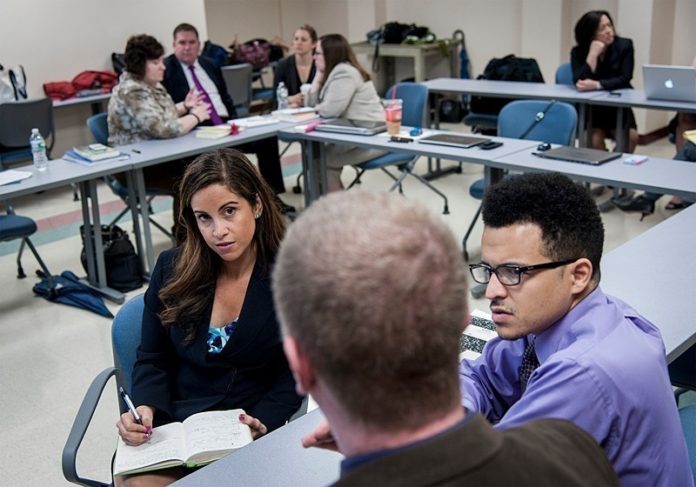
Nine educators training to become principals in struggling school systems spent the morning of May 1 focusing on resistance, as they worked to refine their leadership skills.
In one role-playing exercise at R.I. Department of Education offices, Yanaiza Gallant of Providence played an administrator trying to work with a teacher who had sought help in teaching an unruly class, but then refused the guidance offered. Jonathan Santos Silva of Providence played the teacher.
“The lessons I do are well-planned,” said Silva, challenging Gallant’s observation of continued confusion in the classroom. “At some point, it comes down to the kids. I put the structure in place. Those kids that want to learn are learning. The other kids, their feet had to be held to the fire.”
Gallant responded: “These are our kids, right? I would say they do want to learn.”
The daylong workshop, which also involved brainstorming and other activities, focused on approaches that could help deal with resistance, including Gallant’s assertion of a supportive learning environment for all students, even the disruptive ones. In the Aspiring Turnaround Leaders program, which is part of RIDE’s Academy for Transformative Leadership, the mission is to build skills and values that help would-be administrators lead.
“I wasn’t trying to shift [this teacher’s] thinking on this mental model because that’s going to take a long time,” Gallant explained to the group, referring to language like “those kids.” “What I was trying to do was … make him uncomfortable so he would be less likely to say that.”
Andrea LaRocca, director of the New York City Leadership Academy, which partners with RIDE in running the Aspiring Turnaround Leaders Program, observed that the direct approach Gallant was taking with this teacher seemed to be meeting with even more resistance as the role-play went on.
“As the head of [human resources], your decision might need to be [that] this is a teacher that will not teach in your school,” LaRocca said. “And you might get information that [shows] this is a big problem in your school overall.”
The hypothetical situation that set up the role-play was based on an actual experience of another principal candidate. All nine candidates aim to be principals in Rhode Island’s so-called “turnaround schools” – schools that are persistently low-performing academically.
All nine educators, from both in and outside of Rhode Island, successfully applied to participate in yearlong residencies at turnaround schools here. They started with a three-week, intensive instructional program at RIDE in the summer, followed by a yearlong residency in which they work in one school with a mentor from September through February, then switch to a different school for the remainder of the school year.
The federally funded program began in 2010 and leads to a license to serve as a school principal.
In 2012, the first cohort of four educators completed the program and were placed in identified turnaround schools that needed intervention and specially trained people, said Deborah Gist, commissioner of elementary and secondary education.
“What we wanted to do was have a model for using all the best-known research on what it takes to develop a great principal and give them an opportunity to work with one another while they’re in an actual placement,” said Gist.
Rhode Island has more than 27 turnaround schools, including other facilities dubbed “warning schools” that are scattered around the state, said Gist and Sarah Anderson, a transformation specialist with RIDE and an instructor in the program.
This past year, there were 42 applicants to the program, Anderson said.
Role-playing is a good way to try out tools used to handle difficult situations, Anderson said.
“Being in a school is always highly charged emotionally for everyone in the building,” said Anderson.
One of the four candidates from 2012 who began working as an acting principal at Woonsocket Middle School in July 2013 is Chris Lopardo of Cranston. He had been an assistant principal of Esek Hopkins Middle School in Providence prior to participating in the program.
Lopardo said he wanted to lead a turnaround school because he wanted to take standards the program teaches, like resiliency, communication skills, situational problem-solving and focusing on student performance, and apply them in a setting that needs more success. •












